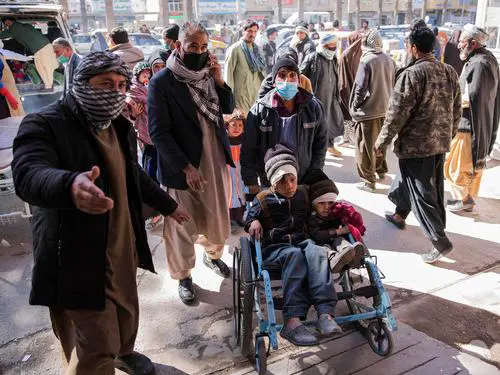The dispute between Taliban and Afghan government over the release of thousands of Taliban prisoners remains a hurdle for launching intra-Afghan peace talks scheduled on March 10, local experts said. The United States and the Taliban inked a peace deal in Qatar's capital Doha on Feb. 29 to end Washington's longest war and facilitate the beginning of an intra-Afghan dialogue to find a negotiated settlement for Afghan lingering crisis.
Under the agreement, the United States would reduce its forces in Afghanistan to 8,600 within 135 days and all the U.S.-led coalition forces would return home within 14 months from Afghanistan depending on Taliban's meeting the conditions envisaged in the agreement, including severing ties with terrorist groups such as Islamic State and al-Qaida network.
Taliban also assured the start of intra-Afghan negotiation if the accord, requiring the release of about 5,000 Taliban prisoners, was fully implemented.
The Taliban group also agreed to release 1,000 Afghan soldiers in response.
"The release of Taliban prisoners has direct link to the security of Afghan people. I will issue a decree on prisoners' release tomorrow (Tuesday)," Afghan President Mohammad Ashraf Ghani said in his speech after taking the oath for a second five-year term earlier on Monday.
"In exchange of prisoners' release, the violence will be reduced," Ghani said, adding the government would also release the names of a negotiation team by Tuesday to take part in intra-Afghan peace talks with Taliban.
Dad Mohammad Anaby, a political expert, said a lasting ceasefire and direct talks through an intra-Afghan dialogue is hoped to pave the way for the prisoners' swap.
"The key to the peace problem is the Taliban persuasion to accept a long-term truce before the start of the intra-Afghan negotiations. But the group persists on their position that they don't recognize the government and would continue war unless thousands of their inmates are released," Anaby who leads the state-run Islah daily told Xinhua on Monday.
Meanwhile, the Taliban group has expressed readiness for taking part in intra-Afghan talks, expected to take place in a foreign country.
"If the provisions of the agreements are implemented and prisoners are released, the Islamic Emirate (name of Taliban's hosted regime) is prepared for intra-Afghan negotiations on March 10. Our negotiation team and agenda are ready and will go ahead as agreed. If the negotiations are delayed beyond the stated date, the responsibility will rest with the others," Suhail Shaheen, a Taliban spokesman from the outfit's political office in Qatar, said on Twitter.
On the other hand, purported Taliban spokesman Zabihullah Mujahid rejected what he called a U.S. allegation that the group was not committed to the agreement's provisions.
"We categorically reject allegations by U.S. intelligence officials to U.S. media that the Islamic Emirate has no intention of abiding by the agreement. The agreement implementation process is going well so far and such comments by U.S. officials cannot be justified," Mujahid tweeted recently.
Cautiously optimistic about a future peace prospect, Anaby said continuation of violence would badly affect the highly anticipated intra-Afghan talks.
Another expert believed it is too early to say if the new Afghan government is capable of managing inclusive peace talks with the Taliban.
"If the new government can manage a strong representation made from among political parties, civil society, women activists and the youth and most importantly win the international support during the direct peace talks with the Taliban, it will undeniably be successful to end the long war and restore a lasting peace in the country," political expert Hamidullah Arefi told Xinhua.
However, any failure of Afghan politicians to settle their internal disputes, particularly the post-election issues, would result in the new government having a weak representation, and the Taliban would further strengthen their political situation and avail more opportunity to impose their tough demands following the deal, said Arefi.
Regarding the Taliban's possible reintegration into the Afghan society, Arefi said "it would be difficult ... the people doubt the mutual understandings between the warring sides."
Arefi opined that there will be no threats from the militant prisoners if released, adding some jailed fighters suffer serious illness and some are too old to return to the battlefields.
"But there are some suicide attackers and Taliban commanders that may pose threats to the Afghan government in the future. That's why the government insists on not swapping, unless the Taliban agree to a complete ceasefire and intra-Afghan talks," he said.
Hundreds of people including government soldiers were killed or held hostage during the Taliban militants' attacks in various parts of the country, following the resumption of conflicts after a violence reduction week ended late February.
 简体中文
简体中文




